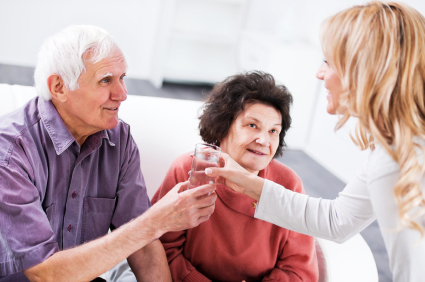Where The Needs Of Others Come First · Available 24x7 For Emergencies
 Preventing Dehydration in The Elderly In Oceanside And Elsewhere
Preventing Dehydration in The Elderly In Oceanside And Elsewhere
Dehydration in the elderly can be a significant problem. Many times it is the unrecognized cause of hospitalizations, sickness and death. Dehydration is also sometimes linked to infections that can be fatal. It becomes an even bigger problem during the heat of the summer months or during a heat wave at any time. It is critically important that dehydration in the elderly be understood, and prevented, by providers of home health care.
In Oceanside and everywhere else, older adults are more vulnerable to becoming dehydrated due to losses in muscular mass, total body water, and bone mass. If an older person is sick, they can become dehydrated more quickly without ever being aware of it. Additionally as we age, the thirst sensation decreases thus compounding the problem.
Detecting Dehydration In The Elderly
Early detection of this condition is essential but is sometimes difficult because the classical physical signs of dehydration may be absent or misleading in an older person.
Some dehydration symptoms to watch for in Seniors include the following:
- Dry, cracking skin
- Frequent headaches
- Parched, chapped lips
- Low urine output and/or constipation
- Nasal passages that are particularly dry and/or bleeding
In cases of severe dehydration, changes in blood pressure may also occur. The individual may also act excessively irritable, disoriented or confused and may become dizzy or lightheaded. Prompt intervention is crucial.
Avoiding Dehydration in The Elderly
The best way to prevent dehydration is to drink plenty of fluids and be watching for symptoms. Caregivers should be constantly aware of the risk factors and signs of dehydration in persons under their care, especially the elderly.
Home health care workers in San Diego County and elsewhere should take steps to make sure that the older adults under their care maintain a normal level of hydration. This can be accomplished by encouraging them to drink fluids frequently and by offering them a variety of liquids. Steady levels of hydration can be best maintained in older adults by having them drink smaller amounts of liquids more frequently throughout the day, rather than having them drink larger amounts at less frequent intervals.
However please note: not all fluids are helpful in preventing dehydration. Some fluids such as alcoholic beverages, tea and coffee can contribute to dehydration and should be avoided. If they are consumed, then additional liquids are needed to offset any fluid loss.
The simplest, and often the best, choice for liquids is plain water.
Treating Dehydration In The Elderly
If you suspect that a person has suffered severe dehydration, and their primary care physician is not available, you should seriously consider having the person be seen at an urgent care center or hospital emergency department. The doctor or medical personnel there may decide to supply fluids via an intravenous solution (IV) if they find the dehydration to indeed be significant.
A healthcare professional should also always be consulted when complications exist or in the cases of diabetes being a factor. When a diabetic becomes dehydrated, additional medications such as synthesized hormones or anti-inflammatory drugs may be needed to aid in fluid retention and decrease urination.
Sometimes, the medical personnel whom you consult may make the assessment that it is appropriate for you to help the Senior be treated at home with fluid replacement treatment instead of, or following, IV rehydration therapy.
Fluid replacement at home involves gradually replenishing water loss, usually over 48 hours, by using appropriate replacement fluids. Examples of appropriate replacement fluids for rehydration include:
- Water
- Clear broths
- Popsicles
- Jell-O
- Drinks that contain electrolytes (Pedialyte, Gatorade, Powerade, etc.)
Monitoring urine output is the best way to determine if the rehydration therapy is working. When the body is dehydrated, the kidneys try to hold on to as much fluid as possible. Because of this, urine output is decreased and the urine itself is concentrated. As treatment begins, the kidneys sense the increased fluid and urine output increases.
Originally posted 2012-07-12 14:00:08.
